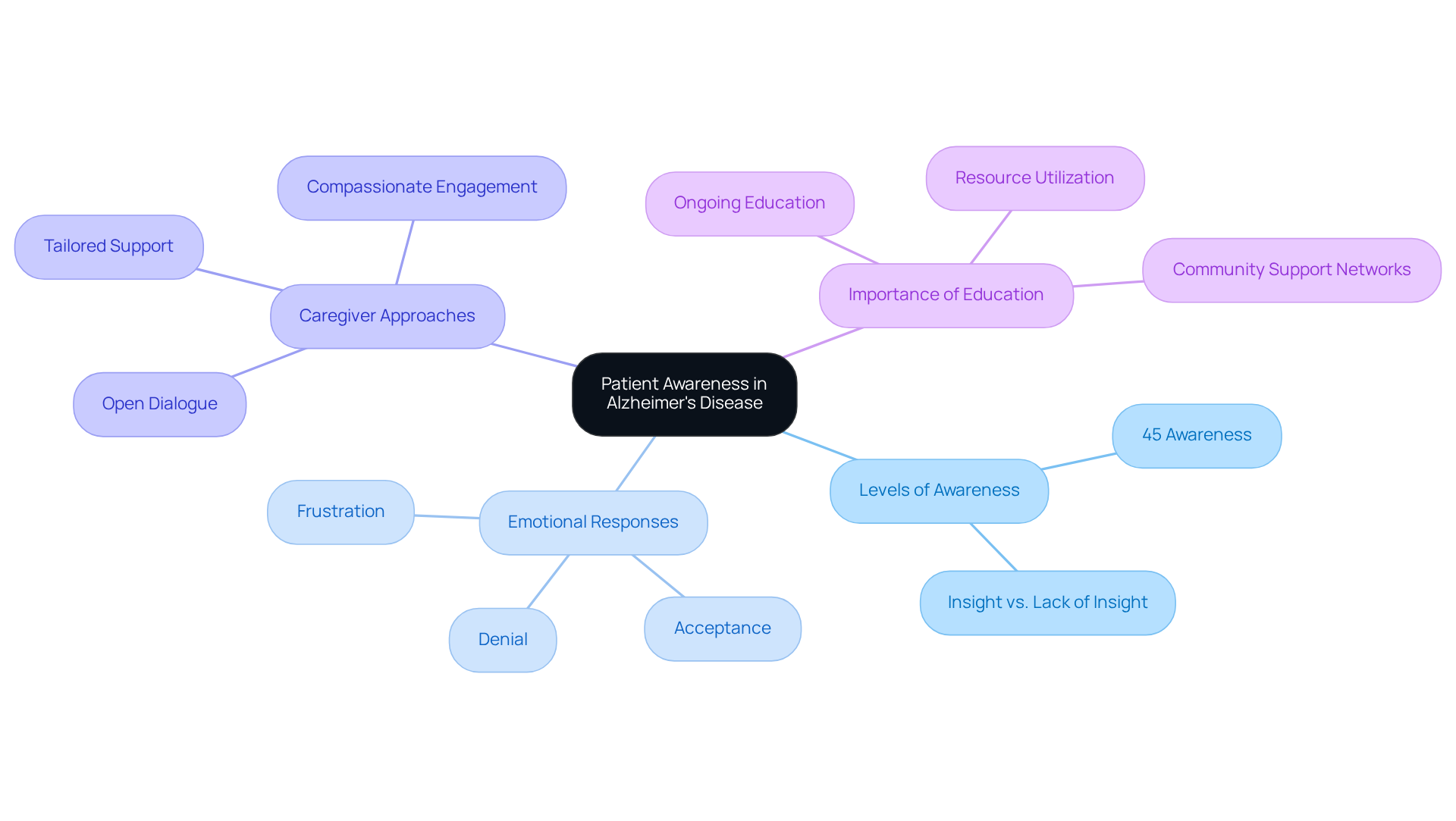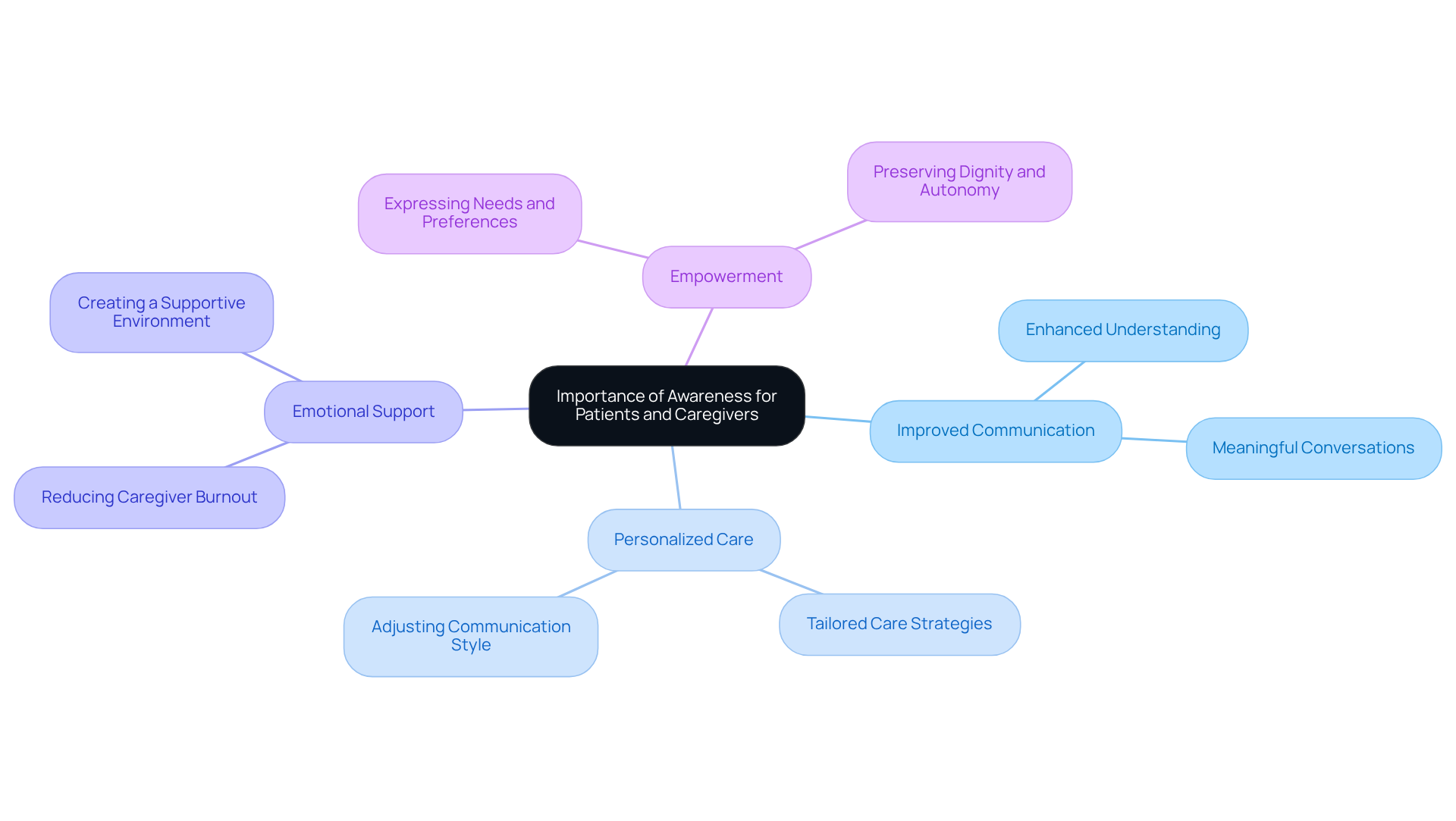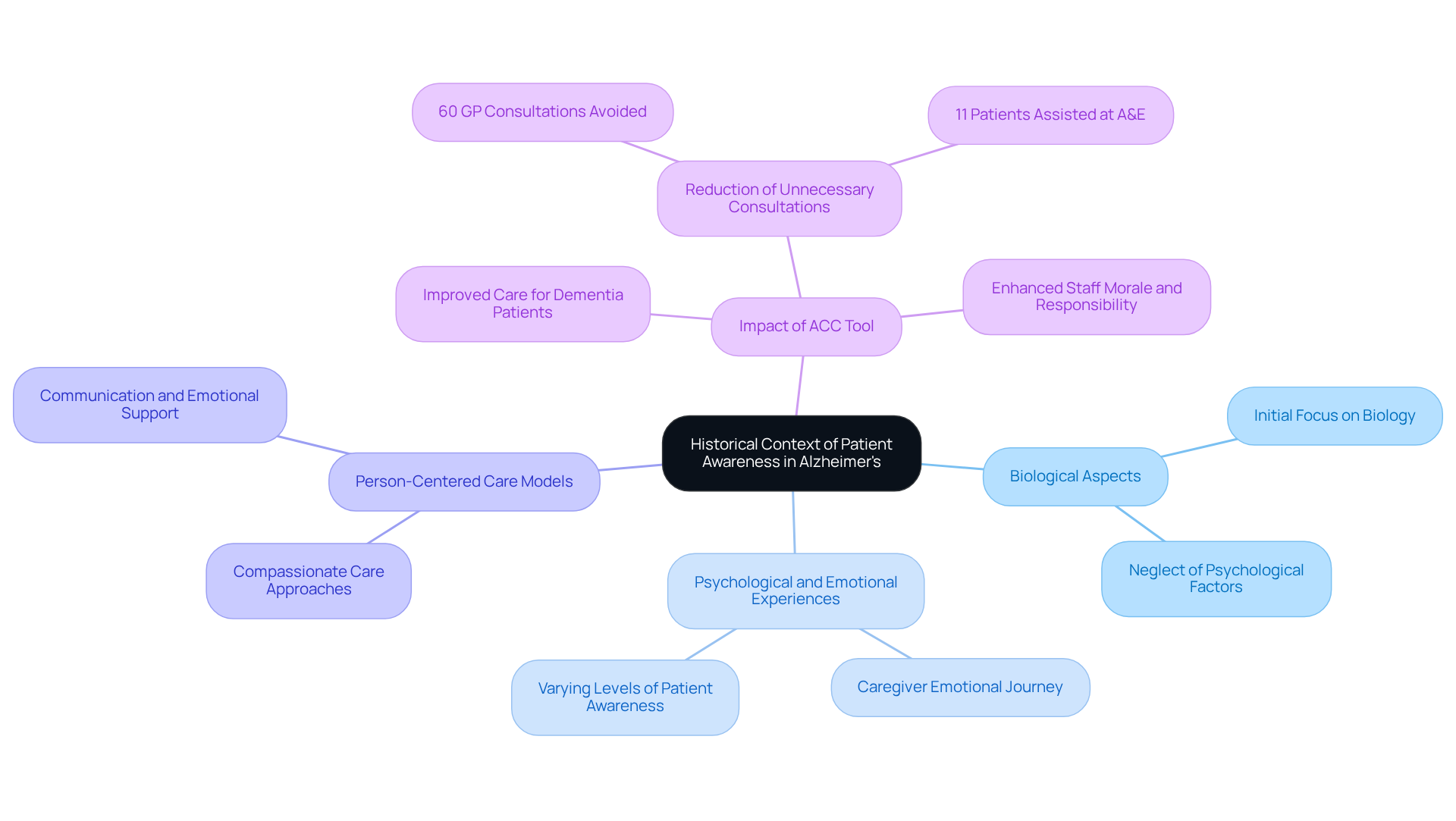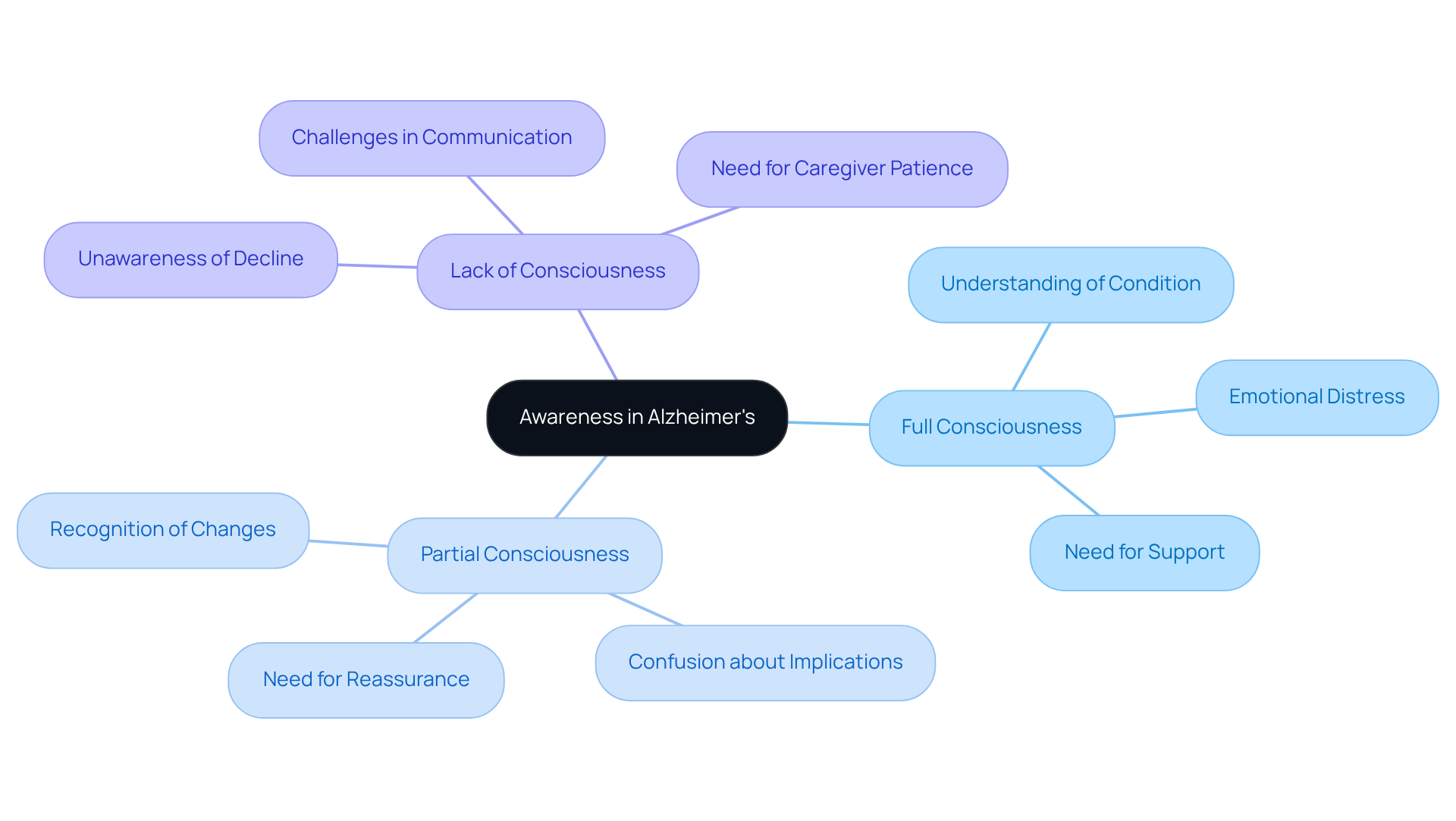Overview
Alzheimer’s patients often have different levels of awareness about their condition. Research shows that around 45% of them have some insight into their cognitive decline. This variability can deeply affect how patients feel and how caregivers respond. When patients understand their situation, it opens the door for better communication and personalized support. This understanding can truly enhance the quality of life for those living with Alzheimer’s.
For caregivers, this journey can be emotionally challenging. The stress and burnout they experience are real, and it’s important to acknowledge these feelings. By offering compassionate care and understanding, we can help ease some of that burden. Providing emotional and practical support is essential, and there are services available that focus on nurturing both the patient and the caregiver.
Remember, you’re not alone in this. There are resources and communities ready to support you. Together, we can create a more compassionate environment for everyone affected by Alzheimer’s.
Introduction
Understanding the complexities of Alzheimer’s disease goes beyond just medical definitions; it truly touches the emotional landscapes of both patients and caregivers. The varying degrees of awareness among individuals with Alzheimer’s can deeply shape their experiences and interactions. This raises an important question: do Alzheimer’s patients know they have it?
By exploring this critical aspect, we can uncover how awareness influences not only the emotional responses of those affected but also the caregiving strategies employed by loved ones. What does this awareness—or lack thereof—mean for the quality of care and the dignity of those living with the disease?
As we navigate these questions, it’s essential to recognize the emotional challenges faced by caregivers. The stress and burnout they experience can be overwhelming. However, there are compassionate services available that provide the support needed to ease this burden.
Through personal stories and testimonials, we can see the profound impact of nurturing care. These accounts highlight the importance of understanding and addressing the emotional needs of both patients and caregivers. Together, we can foster a deeper emotional connection that reassures everyone involved.
In this journey, let’s remember that awareness can lead to better care and a greater sense of dignity for those living with Alzheimer’s. With the right support, we can create an environment where both patients and caregivers feel valued and understood.
Defining Patient Awareness in Alzheimer’s Disease
Understanding dementia can be a deeply emotional journey for both patients and caregivers. It involves recognizing the cognitive decline and its impact on daily life. This awareness varies greatly; some individuals maintain insight into their situation, while others may not realize the extent of their cognitive challenges, raising the question: do Alzheimer’s patients know they have it? Research indicates that about 45% of those with Alzheimer’s have some level of awareness about whether do Alzheimer’s patients know they have it. This insight can profoundly influence their emotional responses and interactions with caregivers. For instance, how do Alzheimer’s patients know they have it can influence their feelings of frustration or denial, while others may come to terms with their condition, leading to different approaches in care and treatment.
For caregivers, grasping this spectrum of awareness is crucial. It shapes how they provide support and engage with individuals. By tailoring their approaches to match the person’s level of understanding, caregivers can foster a more compassionate and effective caregiving environment. Moreover, when individuals comprehend their condition, they often take a more active role in seeking help and participating in their care plans, which can enhance their quality of life. This dynamic underscores the importance of ongoing education and open dialogue about cognitive decline, ensuring that individuals feel supported and understood throughout their journey.
As neurologists often remind us, “Individuals living with dementia are typically capable of more than we can conceive.” This highlights the potential for engagement and understanding among those affected. Real-life stories illustrate this beautifully; some individuals express their feelings about their condition through creative outlets, which can foster a sense of connection and purpose. Additionally, a remarkable 95% satisfaction rate among users of resources designed for caregivers showcases the effectiveness of these tools in enhancing knowledge and understanding. This reinforces the importance of integrating insights from case studies, demonstrating how awareness can lead to greater advocacy and support for individuals with Alzheimer’s.
Importance of Awareness for Patients and Caregivers
It is vital for many reasons to understand whether do Alzheimer’s patients know they have it. When individuals have a certain level of understanding, it can significantly improve communication with caregivers and family members. This connection allows for more personalized care, which is so important. It also empowers individuals to express their needs and preferences, helping to preserve their dignity and autonomy.
For caregivers, recognizing an individual’s level of awareness can shape effective care strategies. By understanding how much do Alzheimer’s patients know they have it, caregivers can tailor their approaches. This customization not only enhances the caregiving experience but also fosters a more supportive environment.
Imagine a caregiver who, after learning about a loved one’s awareness, adjusts their communication style. They might use simpler language or engage in more meaningful conversations, creating a bond that feels nurturing and compassionate. This understanding can alleviate some of the stress and burnout caregivers often face, reminding them that they are not alone in this journey.
Ultimately, fostering awareness in individuals with Alzheimer’s is about more than just care; it’s about connection, dignity, and support. Together, we can create an environment where everyone feels valued and understood.
Historical Context of Patient Awareness in Alzheimer’s
Understanding individual consciousness in Alzheimer’s disease has come a long way, and it’s important to recognize the emotional journey that caregivers face. Initially, many studies focused solely on the biological aspects of the disease, often neglecting the psychological and emotional experiences of those affected. However, as our knowledge has grown, so has our awareness that individuals may have varying levels of understanding about their condition, raising the question of whether do Alzheimer’s patients know they have it.
This shift in perspective has led to more compassionate caregiving approaches, highlighting the critical role of communication and emotional support. The development of person-centered care models truly reflects this understanding, placing the individual’s perspective and experiences at the heart of the caregiving process.
As Ms. Tracie Keats beautifully expressed, “The ACC has had an incredible impact on the care of people with dementia and learning disabilities.” This statement underscores the real-world implications of this evolving perspective. Moreover, the ACC tool has demonstrated significant results, such as preventing around 60 unnecessary visits to general practitioners and emergency rooms. This illustrates how a deeper public understanding can lead to improved caregiving practices, ultimately easing the burden on caregivers and enhancing the quality of care provided.
Key Characteristics and Variations of Awareness in Alzheimer’s
Understanding the journey of individuals with Alzheimer’s can be deeply emotional. It’s essential to recognize the cognitive decline they experience, the changes in their daily functioning, and their ability to express feelings about their situation.
Consciousness can vary significantly among these individuals. Some may have full consciousness and fully grasp their condition and its implications, raising the question of whether do Alzheimer’s patients know they have it. Others might experience partial consciousness, raising the question of whether do Alzheimer’s patients know they have it, as they notice some changes but don’t fully understand their significance. Then there are those who lack consciousness altogether, raising the question of do Alzheimer’s patients know they have it, as they remain unaware of their cognitive decline.
Each type of awareness brings its own set of challenges and opportunities for caregivers. These nuances influence how care is provided and how patients are supported in their daily lives.
As caregivers, it’s vital to approach these situations with compassion and understanding. By recognizing the emotional landscape of those we care for, we can offer the support they need. Remember, you’re not alone in this journey. There are resources and communities ready to help you navigate these challenges with love and care.
Conclusion
Understanding the level of awareness in Alzheimer’s patients is crucial for their well-being and the effectiveness of caregiving. It’s heart-wrenching to see how awareness can vary so much among individuals. Some may recognize their condition, while others remain blissfully unaware. This spectrum of understanding not only shapes emotional responses but also guides caregivers in how best to support their loved ones.
By tailoring care strategies to align with each patient’s level of awareness, caregivers can foster more compassionate and effective environments that promote dignity and autonomy. The emotional journey faced by both patients and caregivers is profound. Communication plays a vital role, and as we evolve our understanding of patient awareness in Alzheimer’s care, we can make a significant difference.
Recognizing the diverse experiences of individuals with Alzheimer’s can lead to enhanced engagement in care and an improved quality of life. The historical context reveals a shift towards more person-centered care models that prioritize the emotional and psychological aspects of dementia. This shift is not just a trend; it’s a necessary evolution in how we approach care.
Ultimately, fostering awareness among Alzheimer’s patients is about creating connections, preserving dignity, and ensuring that individuals feel valued and understood. Encouraging open dialogue and education about cognitive decline allows caregivers and families to navigate this challenging journey together. Emphasizing awareness not only enhances the caregiving experience but also empowers patients to express their needs. This paves the way for a more supportive and empathetic approach to Alzheimer’s care.
Frequently Asked Questions
What is patient awareness in Alzheimer’s disease?
Patient awareness in Alzheimer’s disease refers to the understanding individuals have regarding their cognitive decline and its impact on their daily lives. This awareness can vary greatly among patients, with some recognizing their condition while others may not.
Do Alzheimer’s patients know they have the disease?
Research indicates that about 45% of individuals with Alzheimer’s have some level of awareness about their condition. This awareness can significantly influence their emotional responses and interactions with caregivers.
How does awareness of Alzheimer’s affect patients’ emotions?
The level of awareness can lead to different emotional responses; some patients may feel frustration or denial, while others may come to terms with their condition, which can affect their approach to care and treatment.
Why is understanding patient awareness important for caregivers?
Understanding the spectrum of awareness among patients helps caregivers tailor their support and engagement strategies. This can foster a more compassionate and effective caregiving environment.
How does awareness influence patient involvement in their care?
When individuals comprehend their condition, they are often more active in seeking help and participating in their care plans, which can enhance their quality of life.
What role does ongoing education play in patient awareness?
Ongoing education and open dialogue about cognitive decline are essential to ensure that individuals feel supported and understood throughout their journey.
How can creative outlets benefit Alzheimer’s patients?
Some individuals express their feelings about their condition through creative outlets, which can foster a sense of connection and purpose.
What is the satisfaction rate among caregivers using support resources?
There is a remarkable 95% satisfaction rate among users of resources designed for caregivers, highlighting the effectiveness of these tools in enhancing knowledge and understanding.





